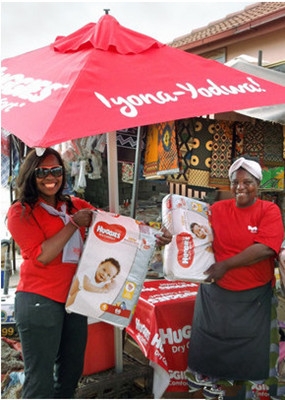商業報道
Building brands in Africa
在非洲建立品牌效應
Pyramid scheme
金字塔計劃
To reach Africa's poorest consumers, face-to-face contact works best
要獲得非洲最窮困消費者的心,最好莫過于面對面交流
DISPOSABLE nappies take up much of the shelf space at the ABC Supermarket in Kliptown, a district of Soweto, an urban sprawl west ofJohannesburg.
約翰內斯堡西部城市擴張到Soweto,一次性尿布充斥在Soweto的Kliptown地區的ABC超市的貨架上。
Kliptown is a baby town, says Mossa, the ABC's owner.
Kliptown是一座嬰兒鎮,ABC超市店主Mossa說。
His store carries a wide range of nappies, from global brands such as Huggies and Pampers to less familiar lines fromEgyptandTurkey.
他的商店里擺放著各種類型的尿布,哈吉斯和幫寶適這樣的全球品牌到埃及,土耳其一些不太出名的品牌.
Outside its doors a team of locals is promoting Huggies to passing mums.
在超市門外,則有一隊本地人給那些路過的媽媽們促銷哈吉斯尿布。
Like Pampers they are sold singly so parents can buy one for when a reliable nappy is critical.
像幫寶適這樣的尿布,他們就是單獨地賣,因此父母們可以因為尿布的可靠性而信賴這品牌從而為它買單。
However, says the team leader, Sipho, Huggies also come in a bag that will safely store a used nappy until it can be binned.
然而,這隊促銷者的隊長Sipho說,哈吉斯也開始提供可以放置使用過尿布的袋子,直到它們被扔進垃圾桶也不會泄露。
 Sipho's team works for The Creative Counsel, a firm that specialises in marketing to the poorest consumers at the bottom of the pyramid, a term popularised by the late C.K. Prahalad, a management guru.
Sipho's team works for The Creative Counsel, a firm that specialises in marketing to the poorest consumers at the bottom of the pyramid, a term popularised by the late C.K. Prahalad, a management guru.
Sopho的團隊創意忠告這家公司工作,這家公司專門面向處于金字塔底端的最窮困消費者們經營,金字塔底端這個詞在管理領袖C.K.Prahalad時代后期流行起來。
TCC was established in 2001 as a two-person advertising agency by Ran Neu-Ner and Gil Oved.
TCC公司于2001年有兩個廣告代理機構Ran Neu-Ner 和 Gil Oved創建。
It has grown into one of South Africa's largest.
在南非,它已經是行業里的佼佼者。
As well as Kimberley-Clark, the maker of Huggies, its clients include Unilever, Danone and Vodacom, part of Vodafone.
和哈吉斯制造商Kimberley-Clark一樣,它的客戶包括聯合利華集團,法國達能集團和南非沃達康集團及沃達豐集團部分業務。
TCC wins business because, as well as crafting a sales message, it can deploy a small army of people like Sipho to deliver it.
TCC贏得商機是因為,一方面它能制作銷售信息,另一方面能部署想Sipho這樣的團隊人才來推廣銷售。
In the past international firms often took a simplistic view that African consumers aspired to a Western lifestyle, says Mr Oved.
過去,國際公司經常對非洲消費者持有過分簡單化的觀念,就是他們向往歐洲式的生活方式,Oved說。
But billboard and newspaper campaigns based on that premise lacked impact.
但是基于這些觀念的廣告和報紙宣傳缺乏實際影響力。
Imported television ads dubbed in local vernacular were scorned.
以本地方言配音進口的電視廣告受到了嘲笑。
Building brand loyalty among low-income shoppers is a job best done by folk who speak the language and know the lives of people they are selling to.
在低收入消費者中建立起品牌忠誠度的差事最好交給當地說著方言,并且很了解他們銷售商品的顧客的生活的人來做。
That is why in places like Soweto TCC employs locals to work as cheerleaders for brands.
那就是Soweto的TCC公司雇傭當地人為品牌作宣傳隊長的原因。
Its promoters can be found in strip malls and taxi ranks, and at funerals and weddings.
在葬禮、婚禮,零售店、計程車候車站,到處可見TCC的促銷員們。
Red-shirted Vodacom promoters dispense advice on phones and call plans.
穿著紅色T恤的沃達康促銷員們給顧客提供電話和話費套餐的建議。
Envoys for Unilever inSowetomake up to 100 house calls a day hawking Lipton teas, Knorr seasonings and other products from the firm's range.
Soweto的聯合利華的促銷員們每天打將近100個家庭電話去推銷立頓茶包、家樂調味品和其他的公司銷售范圍的產品。
On a busy weekend TCC might have 10,000 promoters at work.
在一個繁忙的周末里,可能會有10,000個銷售員在工作。
To manage this army requires hundreds of office staff and no little technology.
要管理好這支隊伍需要上百個公司員工和很大的技術投入。
The firm thus employs an unusual mix of logistic and artistic people.
因此公司雇傭了不同以往的擅長后勤與藝術性混搭的成員。
On-the-ground intelligence about how a new campaign is faring is fed back to headquarters, so it can be tweaked if need be.
當地的關于怎么進行新的商業策劃的情報已經反饋到總部,因此如果需要的話,它的錯誤可以很快被糾正。
Marketing types the world over know that word-of-mouth recommendations carry more punch than advertisements.
全世界廣泛知道銷售類型里,口頭上的推薦比廣告推薦更有震撼性。
This is especially true inAfrica, where the mass media are fragmented and brands less familiar.
尤其在非洲更是如此。這里的大眾媒體很零散,品牌讓人不太熟悉。
Shoppers on tight budgets can ill afford to make bad choices.
手頭緊張消費者們無法承擔做出一個壞選擇的后果。
They value advice from peers and a chance to sample before they buy.
他們很重視來自同輩的建議,重視在他們之前抽樣檢查的機會。
And they repay such engagement with loyalty.
而且他們會用忠誠回饋這樣的契約。
A survey last year by McKinsey, a consultancy, found that 59% of African grocery shoppers stuck with their favoured brands, compared with 38% that chose the cheapest deal on offer.
咨詢公司麥肯錫去年做過這樣的調查,發現59%的非洲雜貨店消費者們被迫接受他們最喜歡的品牌,而38%的人選擇了最便宜的出售商品。
Yet creating loyalty is only half of the battle.
然而,營造了忠誠度只是戰斗的一半。
Brands must first be on the shelf before they can fly off it.
第一步,品牌企業必須在脫手商品之前把商品擺在貨架上。
Around three-quarters of the money spent in Soweto is captured by informal traders, who sell from spazas (kiosks) and makeshift stalls, says G.G.
花在Soweto的錢大約四分之三被一些被一些小的商人攫取,他們在報攤和臨時攤位上做生意,Minanawe的老板G.G.Alcock說。
Alcock, the boss of Minanawe, an agency that has built a big database of such outlets.
這家機構已經建立了這樣銷售點的大數據庫。
TCC bought a stake in Minanawe in 2011.
TCC于2011年給Minanawe獎金。
It realised it had to devise marketing campaigns for informal traders in parallel with the promotions that it was aiming at consumers.
它意識到它必須策劃針對小商販的市場銷售方案,與目標定在消費者身上的促銷同時使用。
Even the biggest branded-goods firms see value in building links with the spazas.
即使是最大的品牌公司也看到了與報攤銷售點建立聯系的商機。
Minanawe advised Parmalat on such a campaign.
Minanawe建議帕瑪拉特進行這樣的商業策略。
The Italian dairy giant supplied branded menu boards and aprons toSoweto's informal food kiosks to promote the sale of its cheese slices in kotas, quarter-loaves of bread stuffed with chips and a variety of meats.
這個意大利奶業巨頭提供了印有品牌菜單的板子和圍裙給Soweto的小型食物報亭銷售點,目的是提高它旗下的kotas芝士切片的銷量。Kotas是一種蛋糕切片,四分之一是薯片和不同的肉類填充的。
The market is bigger than it might seem.
市場比它可能看起來要大。
Marks, the owner of a modest-looking fast-food spaza in Soweto, says he sells 2,400 kotas a day and spends 20,000 rand each morning on ingredients at his wholesalers.
Soweto的一位看起來很謙遜的快餐食品銷售點店主Marks說,他一天賣2,400份Kotas,并且每天早上要花20,000蘭特在供銷商的食材上。
He may not look it, but he is quite the big cheese.
他可能看不到這點,但是他本身就是一塊相當大的芝士。
 Sipho's team works for The Creative Counsel, a firm that specialises in marketing to the poorest consumers at the bottom of the pyramid, a term popularised by the late C.K. Prahalad, a management guru.
Sipho's team works for The Creative Counsel, a firm that specialises in marketing to the poorest consumers at the bottom of the pyramid, a term popularised by the late C.K. Prahalad, a management guru.
 Sipho's team works for The Creative Counsel, a firm that specialises in marketing to the poorest consumers at the bottom of the pyramid, a term popularised by the late C.K. Prahalad, a management guru.
Sipho's team works for The Creative Counsel, a firm that specialises in marketing to the poorest consumers at the bottom of the pyramid, a term popularised by the late C.K. Prahalad, a management guru.